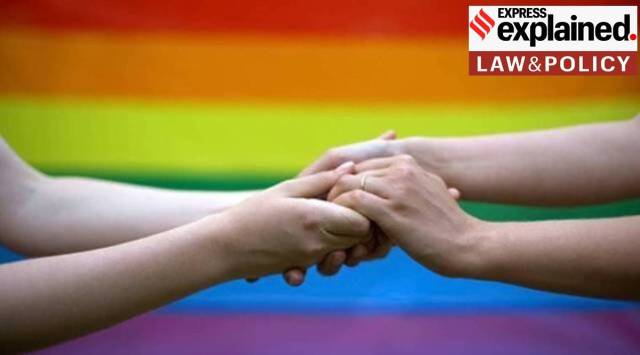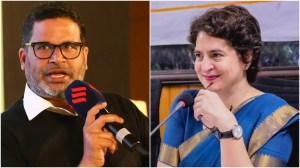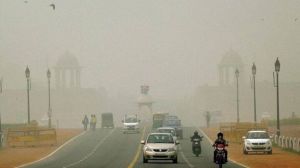SC reserves verdict on same sex marriage: Here are the arguments made over 10 days
Pleas to legalise same sex marriage: Here is a day-by-day account of the arguments before the Supreme Court.
 The petitions argued that marriage brings with it several rights, privileges, and obligations that are 'bestowed and protected by the law'. (File)
The petitions argued that marriage brings with it several rights, privileges, and obligations that are 'bestowed and protected by the law'. (File) The Supreme Court Thursday reserved its verdict on the batch of petitions seeking legal recognition of same-sex marriages after a hearing that lasted 10 days.
The petitions argued that marriage brings with it several rights, privileges, and obligations that are “bestowed and protected by the law”. The Delhi Commission for Protection of Child Rights (DCPCR) also advocated for recognition of marriage, filing an intervention application to assist the court on the impact of such marriages on children.
On the other hand, the respondents, including the Central government, the national child rights body NCPCR, and a body of Islamic scholars called the Jamiat-Ulama-i-Hind, opposed the petitions. Here is a day-by-day account of the arguments that unfolded before the top court.
Day-1
Opening for the petitioners, Senior Advocate Mukul Rohatgi argued that the right to marry for non-heterosexual couples is implicit in Articles 14 (Equality), 15 (Non-Discrimination), 16 (Equality of Opportunity in Public Employment), 19 (Freedom of Speech), and 21 (Right to Life), especially after the SC rulings in ‘Navtej Singh Johar vs. Union of India’ and ‘KS Puttaswamy and Anr. vs. Union of India’.
Rohatgi’s arguments also centred around the interpretation of the Special Marriage Act (SMA), 1954, so that the same is reworded to read marriage as between “spouse” instead of “man and woman”. Besides this, Senior Advocate Menaka Guruswamy added that the right to marry is accompanied by several benefits and rights, such as pensions, provident funds, etc.
On the other hand, SG Tushar Mehta raised preliminary objections to the court’s jurisdiction to hear this case, but the court responded that it would deal with the aspect of maintainability at a later stage.
Day-2
On the second day, Rohatgi pointed to Section 4, SMA, which refers to a marriage in gender-neutral terms, between ‘any two persons’. However, he clarified that merely amending the SMA isn’t enough and that a constitutional declaration of marriage, akin to that of the heterogeneous group, is needed. Indicating that SC’s recognition of same-sex marriage will eventually lead to a situation where society accepts it, Rohatgi said, “This court needs to push society to acknowledge same-sex marriage.”
After this, Senior Advocate AM Singhvi emphasised that marriage equality must encompass the full spectrum of sexual orientations and not just the gay-lesbian binary. Additionally, Singhvi highlighted the importance of removing the 30-day notice period under Section 5 of the SMA on the grounds that it invites unwarranted interference.
Day-3
Nearing the end of his arguments, Singvi highlighted that the notice period under the SMA violates an individual’s privacy along with their personal and decisional autonomy. He also brought in the argument of ‘purposive interpretation’ of existing statutes, reasoning that when the laws were first enacted, homosexuals were not considered. On the question of the minimum age of marriage for non-heterosexual couples, Singhvi submitted that for a lesbian couple, the minimum age may be prescribed as 18 years, while for gay couples it would be 21 years. For transgender couples, the same ages would apply based on what gender they identify with.
Day-4
Senior Advocate Geeta Luthra appeared for a same-sex couple whose marriage was registered in Texas, USA, where one partner was Indian and the other foreign. Seeking recognition for their marriage in India under the Foreign Marriage Act, 1969, she contended that only a marriage against international law would be denied recognition under the FMA. Arguing that it wasn’t the case here as the couple’s marriage was legally recognised in the US, she sought similar recognition in India.
Besides this, the court was informed that invalid queer marriages already exist in our society. Not granting LGBTQIA+ persons the right to marry and have a family would amount to a violation of Article 15, Senior Advocate Jayna Kothari said while pushing for a gender-neutral interpretation of the SMA.
Reiterating the queer community’s fundamental right to marry, Senior Advocate Saurabh Kirpal contended that the State could not deny marriage equality on grounds of “impracticality” as the discriminatory laws were created by it. A concern relating to the protection of queer persons from violence within their natal homes was also flagged by advocate Vindra Grover, who also suggested reading ‘atypical marriages’, recognised by the Mental Health Act 2017, within the SMA.
Day-5
Asserting that queer persons’ right to marry has already been recognised by the Transgender Persons Protection Act, 2019, flowing from the 2014 NALSA judgement, advocate Karuna Nundy argued that all queer identities are part of this term. Advocate Arundhati Katju also stated that throughout history, the court was responsible for ushering in changes, and then sought a positive declaration from the court to solemnise queer marriages, along with a negative declaration binding the State to not discriminate against them.
Appearing for the Centre, SG Tushar Mehta argued that 160 laws would be impacted in the process of bringing marriage equality. Consequently, Mehta said that Parliament is the only forum to make such laws. Adding that the lawmakers had a conscious intent to include only heterosexual marriages under the SMA, Mehta said that the Act’s character and intent cannot be altered.
Day-6
As the arguments entered their sixth day, Mehta argued that under the SMA, the court cannot give rights to non-heterosexual couples that heterosexual couples don’t have. Under SMA, a wife may seek divorce on the ground that her husband has, since the solemnisation of the marriage, been guilty of rape, sodomy, or bestiality, Mehta said. Additionally, Mehta argued the State has a ‘legitimate’ interest in regulating marriages, while citing aspects such as the age of consent, prohibition of bigamy, prescription of prohibited degrees of marriage (which means one can’t marry their lineal ascendants, such as parents, grandparents), judicial separation, and divorce.
Mehta also envisaged a future where arguments on freedom of sexual orientation and autonomy could be raised to challenge the prohibition of incest.
Day-7
As the Bench resumed its proceedings after six days, the Centre suggested forming a committee headed by the Cabinet Secretary to address the “human concerns” of same-sex couples without legally recognising their relationship as “marriage”. However, when the Bench asked the petitioners if, at this stage, they would still like to push for a declaration for a right to marry under the SMA, the petitioners responded that although the measure was welcome, it wouldn’t suffice as a “major solution”.
Singvi added that only the court, and not a circular or committee, can decide “the real, symbolic, actual meaning of marriage,” which is a “juristic question”. Meanwhile, Mehta maintained that the petitioners’ suggestions would be considered by the government as far as legally possible.
Day-8
The Jamiat-Ulama-i-Hind through Senior Advocate Kapil Sibal argued that it was a “very dangerous proposition” to seek a declaration validating same-sex marriages from the court as Parliament isn’t likely to do much. Highlighting that the SMA is only for heterosexual marriages and cannot be misinterpreted by the court, Sibal said, “What they have asked for is not a fundamental right but something short of it but something meaningful.”
As Sibal concluded his submissions, Senior Advocate Arvind Datar, also for the respondents, argued that if same-sex marriage is declared a fundamental right, future legislation or Parliament will not be able to go back. He also said that while the rulings in Navtej or Shafeen Jahan were monocentric, the present dispute is a “polycentric”, one that will affect several legal provisions, possibly wreaking collateral damage or side effects in its wake.
Day-9
Appearing for the child rights body NCPCR, among others, ASG Aishwaraya Bhati submitted that while the concept of gender may be “fluid”, the concepts of mother and motherhood are not. “Entire architecture of our laws is to protect the interest and the welfare of children who are naturally born to heterosexual persons, and the State is justified in treating heterosexuals and homosexuals differently,” Bhati said, adding that the welfare of children is paramount.
Meanwhile, the Centre informed the top court that it had received responses from seven states on the plea seeking legal recognition for same-sex marriages. While Rajasthan, Assam, and Andhra Pradesh opposed the plea, the remaining four — Sikkim, Maharashtra, Uttar Pradesh, and Manipur — sought more time. Additionally, Rohatgi suggested that without an interpretation of the SMA in favour of LGBTQIA+ persons, the court could register marriages under the Registration Act, 1908.
Day-10
On the final day of arguments, Senior Advocate AM Singhvi told the Bench that a civil union, as permitted in some countries, is not a solution to what same-sex couples are asking for. Singhvi said that civil unions are not an equal alternative and do not address constitutional anomalies presented by excluding non-heterosexual couples from the institution of marriage. Further, he said that this exclusion sends a message that it is legitimate to differentiate between the commitments of heterosexual and non-heterosexual couples, by indicating that the latter’s marriages are not as significant as “real” marriages.
In the same vein, Senior Advocate Raju Ramachandran referred to a situation where the court only makes a declaration and leaves the rest to the legislature, as in the cases of triple talaq and the Transgender Act, among others. Reasoning that they were instances where the majority, as reflected in the institution of the legislature, had no serious problem, he urged the court to walk the full mile and protect the petitioners, who were the “unpopular minority” here. Stating that a lack of recognition of LGBTQIA+ persons’ marriage rights will deny them equal protection of the law, Ramachandran said that marriage also offers them societal protection.
Senior Advocate KV Vishwanathan said that more than the right to marry, the question is if the Union has a corresponding duty to recognise associations of non-heterosexual couples as married couples in a non-discriminatory manner.
Bringing in the aspect of the adoption rights of same-sex couples, Senior Advocate Menaka Guruswamy said that over 50 countries allow it, which is more than the countries that allow same-sex marriages.
- 01
- 02
- 03
- 04
- 05






































